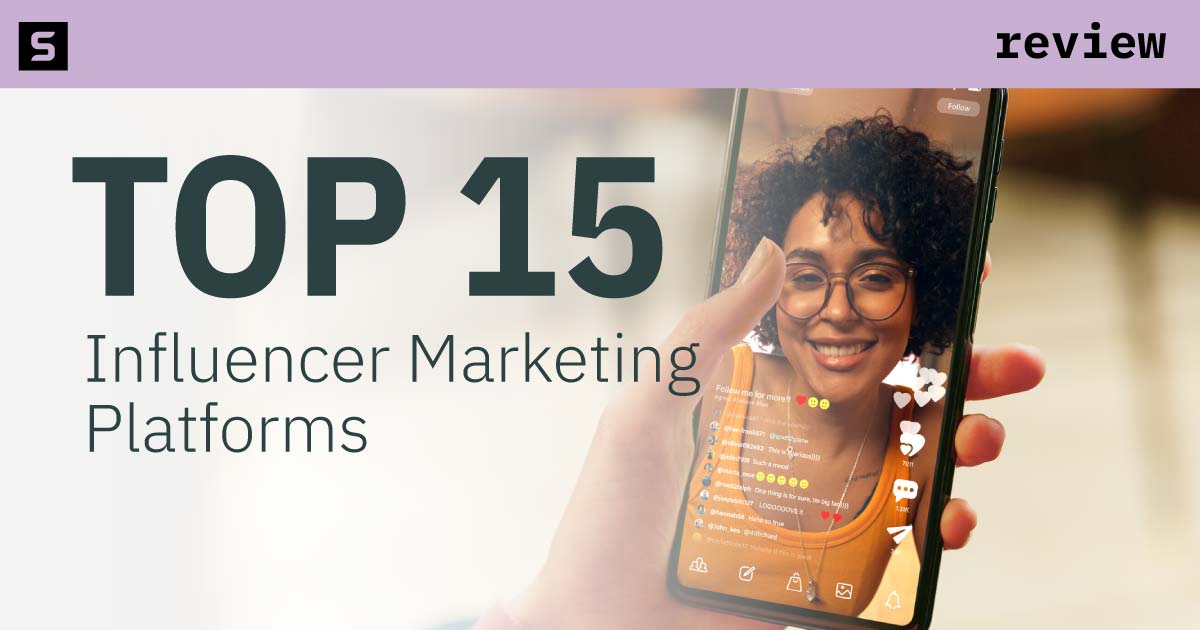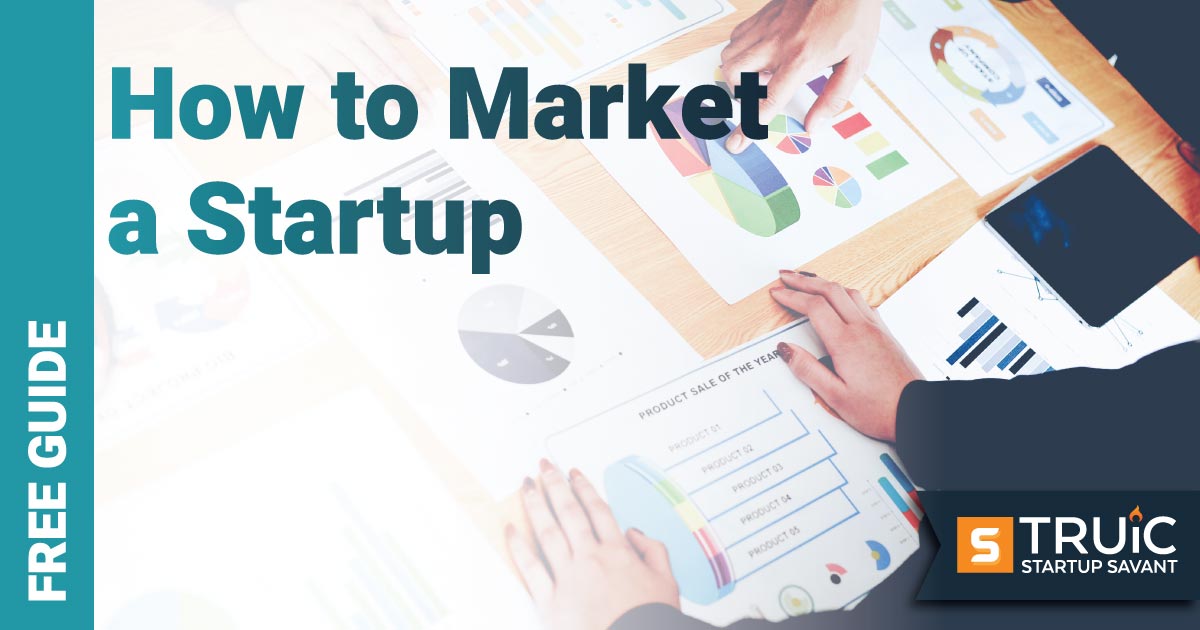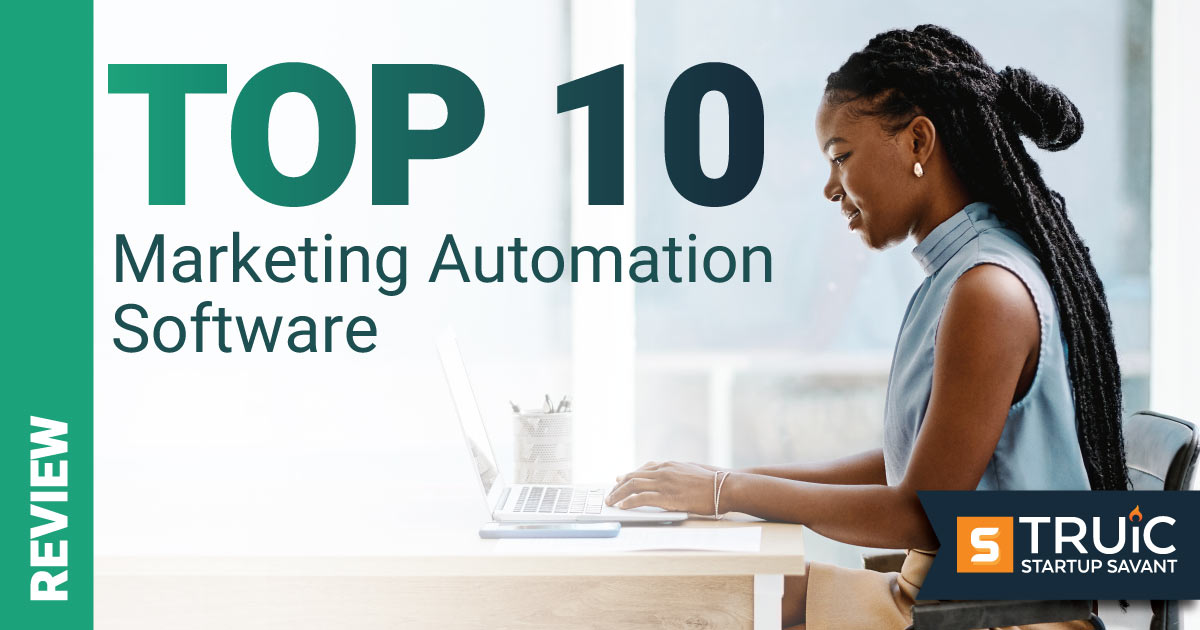15 Best Influencer Marketing Platforms for Startups

Last Updated: By Michaela Dale
Influencer marketing has become an increasingly popular way for startups to reach new audiences and grow their brand. By partnering with influencers who have built a loyal following, startups can tap into that audience to promote their products or services in an authentic way.
However, finding the right influencers and managing campaigns can be time-consuming and challenging — especially for lean startup teams. That's where influencer marketing platforms come in. These tools help simplify the process of discovering, vetting, and collaborating with influencers.
Top Influencer Marketing Platforms for Businesses
With so many influencer marketing platforms available, it can be hard to know which one is the best fit for your startup. Here's an overview of some of the top options with details on key features, pros, cons, and pricing to help you compare them.
1. Upfluence
Best for: Influencer search
Upfluence provides a massive database of more than 7 million influencers across all major social media channels. Its powerful search engine allows you to filter, using more than 20 criteria like location, language, audience demographics, topics, and engagement rates. You can also analyze influencer performance metrics and manage entire campaigns within the platform.
Upfluence is a strong choice for startups that want a comprehensive influencer discovery solution with advanced search and analysis capabilities. It has an intuitive interface and supports multiple use cases — from one-off campaigns to always-on programs.
Pros
- Huge influencer database
- Advanced audience demographics filters
- Granular search capabilities
Cons
- No transparent pricing information
Notable Features
- Commission calculator
- Influential customer identification
- Email automation
- Draft contracts and the ability to issue payments
Pricing
Upfluence requires custom pricing; however, it does offer some free tools like its Chrome extension.
2. GRIN
Best for: Ecommerce brands
GRIN is an end-to-end creator management platform built specifically for ecommerce brands. It covers influencer discovery, relationship management, product seeding, discount code creation, content tracking, and revenue reporting. GRIN integrates with leading ecommerce platforms like Shopify, WooCommerce, and Magento.
If your startup sells products online, GRIN offers all the tools you need to run successful influencer campaigns that drive sales. Its ecommerce-specific features allow you to find effective influencers, manage and track partnerships, and quantify the revenue impact.
Pros
- Ecommerce-focused features
- All-in-one functionality
- Extensive integrations
Cons
- Steep learning curve
Notable Features
- Product seeding
- Multichannel influencer database
- Influencer comparison
- Suite of payment tools
Pricing
GRIN requires custom pricing. To learn more, you must book a demo on the platform.
3. Klear
Best for: Audience analysis
Klear, owned by Meltwater, specializes in providing in-depth audience data and psychographic insights to help you find influencers who reach your exact target customers. It looks at factors like interests, brand affinities, and online behaviors — going beyond basic demographic information. Klear pulls data from leading social media channels and includes campaign management features.
For startups focused on precision targeting and reaching the right audience, Klear's robust audience analytics are a big selling point. Use its insights to find influencers who can put your brand in front of the people most likely to convert.
Pros
- Robust audience insights
- Cross-platform influencer data
- Campaign monitoring features
Cons
- Higher starting price
Notable Features
- Audience demographics and psychographics
- Influencer "Influence Score"
- Visual listening
- Automated reporting
Pricing
Klear offers four packages. However, to obtain pricing information, you must reach out to Klear’s parent company – Meltwater — directly.
4. Shopify Collabs
Best for: Shopify merchants
Shopify Collabs is an influencer marketplace that lives right within your Shopify admin dashboard. Approved Shopify merchants can easily find and partner with vetted creators, generate affiliate links and discount codes, track resulting sales, and pay influencers — all without leaving their store dashboard. It charges no monthly fees, but collects a commission on influenced sales.
If you're already using Shopify to power your startup's online store, Shopify Collabs is a seamless way to layer on an influencer program. With no upfront costs and direct integration with your store data, it minimizes friction and makes influencer partnerships more accessible.
Pros
- Convenient Shopify integration
- Vetted creator network
- No monthly fees
Cons
- Limited to Shopify merchants
Notable Features
- Shopify-exclusive creators
- Gifting and affiliate link tools
- Messaging portal
- Influencer payouts
Pricing
The program is free to install; however, Shopify charges a 2.9% payment processing fee from creator-driven sale commissions.
5. Traackr
Best for: Performance data
Traackr is an enterprise influencer marketing platform that uses proprietary technology to surface high-performing influencers based on their past campaign results. It tracks 50+ performance metrics to determine an influencer's ability to drive reach, engagement, and conversions. Traackr also offers a suite of tools for relationship management, campaign organization, and reporting.
Startups with larger budgets who want data-driven influencer recommendations should consider Traackr. Its emphasis on historical performance data helps identify influencers with proven track records of generating tangible results for brands.
Pros
- Extensive influencer database
- Performance-based search
- Global, multilingual data
Cons
- Custom pricing only
Notable Features
- Influencer discovery engine
- Brand prominence insights
- Influencer network visualization
- Content performance tracking
Pricing
Traackr offers three packages: Growth (starting at $20,000 per year), Standard (starting at $32,500 per year), and Plus (starting at $55,000 per year). To learn more about specific pricing, you must reach out to the company directly.
6. Influencity
Best for: Global influencer hiring
Influencity's influencer marketing platform has robust features for tracking and quantifying return on investment (ROI). It captures post-level performance data across Instagram, YouTube, Facebook, X (formerly Twitter), and blogs, and then ties it to measurable results like traffic, conversions, and revenue. The platform also supports influencer discovery, outreach, and content collaboration.
Startups focused on bottom-line results and demonstrating the value of their influencer spend will appreciate Influencity's advanced ROI measurement capabilities. Its unified, cross-channel analytics make it easy to see which influencer partnerships are driving the highest returns.
Pros
- More than 200 million content creators
- Results calculator measures potential ROI
- Easy-to-read reports and performance metrics
Cons
- No transparent pricing
Notable Features
- Content planner
- Built-in influencer relationship management (IRM) software
- Monthly profile analyses
- Trend research and measurement tools
Pricing
Influencity offers four packages: Basic ($158 per month), Professional ($318 per month), Business ($798 per month), and a custom-priced Enterprise plan.
7. YouTube BrandConnect
Best for: YouTubers and Vloggers
YouTube BrandConnect is an invite-only influencer marketing service that matches brands with established YouTube creators for sponsored-content campaigns. Brands provide a campaign brief and budget, and then YouTube suggests a curated list of relevant partner creators. Once both sides agree to a deal, YouTube facilitates content approvals, payments, and performance reporting.
If your startup is specifically looking to reach audiences on YouTube, BrandConnect is the most direct path to the platform's top influencers. Working with YouTube means less hands-on management for your team because YouTube handles creator relationships, payments, and reporting on your behalf.
Pros
- Access to premium YouTube influencers
- Hands-off campaign management
- Performance-based pricing
Cons
- Only available to select customers
Notable Features
- Curated creator matchmaking
- Video-view pricing model
- Niche audience targeting
- Brand suitability controls
Pricing
YouTube charges on a cost-per-view (CPV) model, therefore the pricing ranges significantly.
8. NeoReach
Best for: Expert guidance
NeoReach is a full-service influencer marketing solution that combines self-serve software with managed services. Its platform, which emphasizes ease of use, supports influencer discovery, outreach, and campaign analytics. Meanwhile, NeoReach's in-house team of experts provides hands-on assistance with strategy, influencer contract negotiation, content creation, and comprehensive campaign management.
For startups that are new to influencer marketing or have lean teams, NeoReach's flexible approach lets you decide how much you want to handle yourself vs. outsource to its specialists. The option to tap NeoReach’s end-to-end services is valuable for those with limited bandwidth.
Pros
- Flexible software and services model
- Supports emerging platforms
- Access to specialized influencer marketing experts
Cons
- Not as well suited to smaller organizations
Notable Features
- Influencer contract creation and negotiation
- Content licensing and compliance
- Advanced reporting and insights
- Creative brief development
Pricing
Contact NeoReach for a demo and pricing based on your company's specific needs.
9. Aspire
Best for: Creator marketplace
Aspire built its influencer marketing platform for managing creator relationships. Use it to organize influencer information, streamline outreach, track conversations, prompt partner actions, and maintain a database of all your brand's influencer contacts. The platform also supports discovery, collaboration, payments, and reporting.
Startups that want to build long-term influencer relationships and keep communications organized as they scale will get a lot of value out of Aspire. It keeps all your influencer intel and interactions in one place and automates manual tasks to save time. Plus, Aspire helps companies measure their ROI to adapt and enhance campaigns.
Pros
- Relationship management features
- Inbound creator applications save time
- Several use cases, including product seeding
Cons
- No payment information available
Notable Features
- Influencer lifecycle management
- Product fulfillment
- Content approval workflows
- ROI forecasting and dashboard
Pricing
Aspire offers three packages; however, you must contact the company for pricing information.
10. Creator.co
Best for: Micro-influencer marketing
Creator.co is an influencer marketplace that prioritizes high-quality content creation. Brands submit a campaign brief and Creator.co matches them with skilled influencers who specialize in creating premium assets in a variety of formats, such as user-generated content (UGC), product for post, giveaways, and in-store experiences.
Pros
- Database of more than 300 million creators
- Custom, professional-grade content
- Dedicated account manager with most plans
Cons
- Mostly micro-influencers
Notable Features
- Brief-based creator matching
- Creator contract exports
- Campaign strategy support
- Giveaway and contest capabilities
Pricing
Creator.co offers four packages: Self-Serve ($460 per month), Start-Up ($1,795 per month), Trailblazer ($2,695 per month), and Bespoke (starting at $3,495 per month).
11. Brandwatch
Best for: Automated reporting
Brandwatch is a social media management platform with built-in influencer marketing functionality. The influencer features emphasize a smooth influencer marketing experience from start to finish, enabling startups to find and manage top influencers to support their brands.
Startups already using Brandwatch to manage their social media presence can layer on influencer discovery and campaign management within the same interface. For brands focused on tracking organic influencer mentions and social listening, its capabilities are quite robust.
Pros
- Unified social suite
- Global influencers and 13 languages supported
- Benchmarking data
Cons
- Steep learning curve
Notable Features
- Influencer discovery tool
- Automated email tracking
- Dedicated influencer customer relationship management (CRM) tools
- Automated reporting
Pricing
Brandwatch doesn’t disclose pricing on its website. You must reach out to the company directly to obtain pricing.
12. TRIBE
Best for: Artificial intelligence (AI) features
TRIBE is an end-to-end influencer marketing platform that streamlines the process of discovering creators, running campaigns, and measuring ROI. It boasts a community of more than 80,000 opt-in creators who are matched to your brand based on your target audience and campaign objectives. You also can import your own creator community for immediate activation.
One standout feature is TRIBE's proprietary AI technology, called BrandMatch AI, which uses machine learning (ML) to instantly identify high-performing creators for your campaigns. TRIBE also provides tools to automate common tasks like communication, product sampling, content approvals, legal agreements, and payments.
Pros
- Large, engaged creator community
- AI-powered creator matching
- Automated campaign workflows
Cons
- Pricing not disclosed
Notable Features
- BrandMatch AI technology
- Branded content licensing
- First-party creator analytics
- Paid social media amplification
Pricing
Tribe doesn’t include pricing information on its website. To obtain pricing, you must request a demo.
13. influence.co
Best for: Influencer discovery
The influence.co platform offers a comprehensive suite of tools for influencer discovery, campaign management, and performance tracking. One of its standout features is the ability for influencers to proactively find and apply to brand campaigns.
Brands can create detailed campaign briefs, outlining their requirements. The influence.co platform will then market these opportunities to its community of registered influencers, typically attracting 40 to100 applicants within the first week. This allows brands to review and select from a pool of interested, vetted influencers.
Pros
- Influencers can apply to campaigns
- Detailed influencer search capabilities
- Build long-term brand ambassador groups
Cons
- Creator vetting process is unclear
Notable Features
- Campaign application portal
- Audience demographic data
- End-to-end campaign workflow
- Brand community management
Pricing
Influence.co offers two plans: a free plan and a Pro plan ($600 per month).
14. Storyclash
Best for: Creator content library
Storyclash is an influencer marketing platform that leverages AI technology to streamline creator discovery, competitive analysis, and campaign management. Its AI algorithms analyze creators' content and past brand collaborations to assess their authenticity and brand fit. You also can find creators who look similar to your top performers by using Storyclash's AI-powered lookalike feature.
One of Storyclash's key value propositions is the ability to reverse-engineer competitors' influencer strategies. By revealing which creators are working with other brands in your space and how those campaigns are performing, Storyclash enables you to refine your own approach and benchmark your success.
Pros
- Unlimited search queries and reports
- Search and recommendations powered by AI
- Unlimited creators in its CRM platform
Cons
- TikTok and YouTube influencer discovery is limited
Notable Features
- Campaign planning and reporting
- Budgeting and ROI tracking
- Performance analysis
- Creator content library
Pricing
Storyclash offers three packages: Light (starting at $999 per month), Professional (starting at $1,999 per month, and a custom-priced Enterprise package.
15. Later Influence
Best for: End-to-end workflow
Later Influence is an influencer marketing platform that supports brands through the entire creator partnership lifecycle. Its suite of tools aims to help companies grow their influencer programs, scale their reach, and optimize performance to drive measurable revenue.
A key focus of Later Influence is maximizing the value of influencer content. Its content syndication tools make it easy to repurpose top-performing creator posts across your own social channels, website, ads, and more. You also can create trackable referral programs to drive direct sales.
Pros
- Support for multiple use cases
- Content syndication tools
- Automated payments and tracking
Cons
- AI features are limited on all plans
Notable Features
- 10+ million creator database
- Ambassador program tools
- Referral link tracking
- Real-time, cross-platform analytics
Pricing
Later Influence offers four plans: Starter ($25 per month), Growth ($45 per month), Advanced ($80 per month), and Agency ($200 per month).
FAQs
What platform is most used for influencer marketing?
The most popular platforms for influencer marketing are YouTube, TikTok, and Instagram.
Which is the most effective form of influencer marketing?
Sponsored posts and reviews that showcase an influencer authentically using and endorsing a product tend to be the most compelling and drive the strongest results. Giveaways and contests also generate a lot of buzz and participation.
What is the average ROI for influencer marketing?
Influencer marketing ROI varies widely, depending on factors like platform, format, creator tier, and industry. On average, brands see a return of about $5.20 per $1 spent with top performers generating $20 or more.


